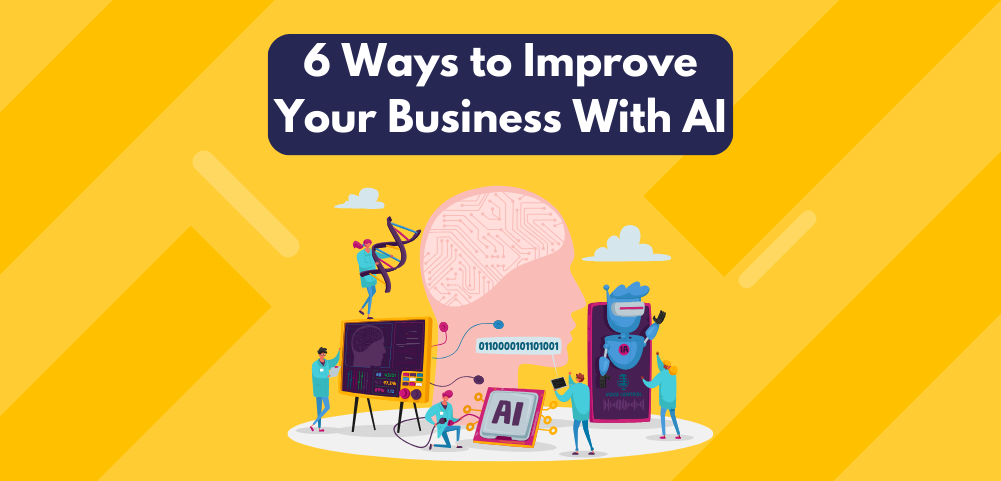6 Ways to Improve Your Business With AI
by Arthur Yang December 18, 2023

In an ever-evolving digital landscape, embracing artificial intelligence (AI) can be a game-changer for small and medium-sized enterprises (SMEs).
As a tradtional business, it might seem daunting at first, but the benefits of incorporating AI into your operations are vast.
Here are six ways AI can significantly improve your business efficiency and outcomes.
1. Automate Small Tasks
2. Segmentation and Personalisation
3. Content Generation
4. Data Analysis
5. Inventory Management
6. Language Translation
7. Conclusion
Let’s go!
AI Tools 2023
#1 — Automate Small Tasks

Automation, powered by artificial intelligence (AI), is a game-changer for small and medium-sized enterprises (SMEs), simplifying tasks and freeing up your valuable time.
It involves using technology to perform tasks without direct human involvement.
AI takes it a step further by enabling systems to learn and adapt, making processes smarter over time.
This not only reduces the risk of errors but also boosts productivity.
For example, you can use AI to schedule social media posts.
AI tools bring ease to maintaining an active social media presence.
They handle the scheduling of posts, analyse audience engagement, and suggest content tailored to your audience’s preferences.
With AI, you can ensure a consistent online presence without the need for constant manual updates.
Currently, there are also AI-driven chatbots that can handle appointment scheduling seamlessly.
This allows your customers to book and reschedule appointments with ease.
This not only saves time but also minimises scheduling conflicts, making your business more accessible to your clients.
Consider using Buffer to automate your social media campaigns.
#2 — Segmentation and Personalisation

AI-driven segmentation enables you to understand your customer base more intimately.
Consumer behaviours can be tracked by AI and similar consumers can be grouped together into a single segment.
By categorising individuals, you can gain valuable insights into distinct customer groups.
This allows you to target your marketing efforts more effectively, tailoring your approach to meet the unique needs of each segment.
For example, if they are interested in art, they are likely to view art supplies, or search for art designs.
AI automatically detects this behaviour and recommends them art-related products or service.
Whether it’s product recommendations, special offers, or content tailored to their interests, AI ensures that your customers receive a unique and engaging experience.
AI also recognises broader trends and events.
During seasonal events like the 12.12 sales period, AI can analyse past customer behaviour, predict purchasing patterns, and recommend products or services aligned with the occasion.
This ensures that your marketing efforts are not only personalised but also timely and relevant.
By leveraging AI for both customer segmentation and personalisation, you can create a tailored experience that resonates with each customer.
The result is a more engaged customer base and a business that adapts seamlessly to the changing seasons and events in the market.
#3 — Content Generation

In the ever-accelerating digital landscape, creating consistent and engaging content is a perpetual challenge for small and medium-sized enterprises (SMEs).
AI-driven content generation leverages advanced technologies, such as Natural Language Processing (NLP), to understand context and produce human-like content.
It is like having an intelligent assistant that not only learns from your existing content but also adopts your brand voice seamlessly.
For your blog, AI can effortlessly generate articles on industry trends, customer insights, or product updates, ensuring a regular flow of engaging content that resonates with your audience.
AI-powered tools can craft compelling and shareable updates tailored to your audience’s preferences.
From witty tweets to informative Facebook posts, AI adapts to your brand voice and keeps your online presence vibrant.
For email campaigns or promotional material, AI can generate persuasive and personalised content to capture your audience’s attention effectively.
This transformative process not only saves time but guarantees a continuous stream of content that connects with your audience.
With AI, you can maintain a vibrant online presence, keep your audience engaged, and focus on the strategic aspects of your business without the content creation burden.
For content copywriting, you can consider ChatGPT.
#4 — Data Analysis

In the intricate landscape of small businesses, the integration of artificial intelligence (AI) into data analysis stands as a powerful catalyst for transformation.
Data analysis, the process of examining and interpreting raw data to derive meaningful insights, becomes exponentially more potent with the application of AI.
Small enterprises harness the capabilities of AI to delve into predictive analytics, foreseeing future trends and customer behaviour by discerning intricate patterns within historical data.
At the heart of this capability is AI’s adeptness in pattern recognition, unveiling nuanced insights from vast datasets.
This helps you understand customer preferences, sales trends, and operational inefficiencies but also empowers you to make informed, real-time decisions.
The efficiency of AI in data analysis serves as a strategic tool for small business owners, enhancing agility and adaptability in the ever-evolving market.
Moreover, AI-driven data analysis provides invaluable customer insights, shaping personalised approaches to meet customer expectations and elevate overall satisfaction.
Operational optimisation, streamlined through AI’s identification of improvement areas, encompasses aspects like supply chain management and inventory control.
The accessibility of cost-effective AI solutions further democratises advanced analytics for small businesses, enabling them to make data-driven decisions without significant upfront investments.
As a guardian of sensitive information, AI also bolsters cybersecurity measures, adding an extra layer of protection.
In essence, the fusion of AI and data analysis empowers small businesses to unravel intricate patterns, make informed decisions, and navigate the dynamic terrain of the modern business world with unprecedented precision.
#5 — Inventory Management

Inventory management is the strategic process of overseeing the acquisition, storage, and tracking of goods within a business.
In this realm, artificial intelligence (AI) plays a transformative role by introducing advanced capabilities to streamline operations.
Automated systems driven by AI enhance reorder point determination, facilitating efficient restocking processes and preventing stock-outs or overstock situations.
This reduces consumer frustration, and reduces cost.
Dynamic pricing strategies also benefit from AI’s real-time data analysis, enabling businesses to implement flexible pricing adjustments based on inventory levels, market demand, and competitor pricing.
By continuously monitoring inventory and analysing demand patterns, AI minimises the risks of stock-outs and excess inventory, optimising operational efficiency.
Furthermore, AI enhances supply chain visibility by providing insights into the movement of goods from suppliers to warehouses to customers.
This transparency aids in identifying bottlenecks, optimising logistics, and improving overall supply chain efficiency.
In essence, AI transforms inventory management by introducing data-driven precision, automating processes, and providing valuable insights that enable businesses to create a responsive and efficient supply chain while minimising operational costs.
#6 — Language Translation
#8 — Conclusion
. . . . .
